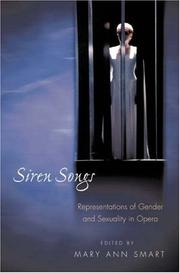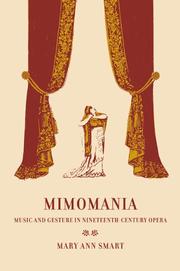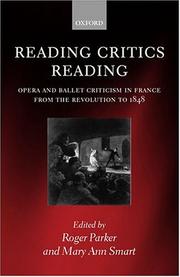| Listing 1 - 10 of 11 | << page >> |
Sort by
|

ISBN: 0691058148 1400866715 069105813X 1322573816 9781400866717 9780691058146 9780691058139 Year: 2000 Publisher: Princeton (N.J.) : Princeton university press,
Abstract | Keywords | Export | Availability | Bookmark
 Loading...
Loading...Choose an application
- Reference Manager
- EndNote
- RefWorks (Direct export to RefWorks)
It has long been argued that opera is all about sex. Siren Songs is the first collection of articles devoted to exploring the impact of this sexual obsession, and of the power relations that come with it, on the music, words, and staging of opera. Here a distinguished and diverse group of musicologists, literary critics, and feminist scholars address a wide range of fascinating topics--from Salome's striptease to hysteria to jazz and gender--in Italian, English, German, and French operas from the eighteenth to the twentieth centuries. The authors combine readings of specific scenes with efforts to situate these musical moments within richly and precisely observed historical contexts. Challenging both formalist categories of musical analysis and the rhetoric that traditionally pits a male composer against the female characters he creates, many of the articles work toward inventing a language for the study of gender and opera. The collection opens with Mary Ann Smart's introduction, which provides an engaging reflection on the state of gender topics in operatic criticism and musicology. It then moves on to a foundational essay on the complex relationships between opera and history by the renowned philosopher and novelist Catherine Clément, a pioneer of feminist opera criticism. Other articles examine the evolution of the "trouser role" as it evolved in the lesbian subculture of fin-de-siècle Paris, the phenomenon of opera seria's "absent mother" as a manifestation of attitudes to the family under absolutism, the invention of a "hystericized voice" in Verdi's Don Carlos, and a collaborative discussion of the staging problems posed by the gender politics of Mozart's operas. The contributors are Wye Jamison Allanboork, Joseph Auner, Katherine Bergeron, Philip Brett, Peter Brooks, Catherine Clement, Martha Feldman, Heather Hadlock, Mary Hunter, Linda Hutcheon and Michael Hutcheon, M.D., Lawrence Kramer, Roger Parker, Mary Ann Smart, and Gretchen Wheelock.
Feminism and music --- Sex in opera --- Women in opera --- Opera --- Sexuality in opera --- Music and feminism --- Music --- Congresses --- Women in opera - Congresses. --- Sex in opera - Congresses. --- Feminism and music - Congresses. --- Opera's --- Seksualiteit --- Uitvoeringspraktijk
Book
ISBN: 9780520276253 0520276256 Year: 2018 Publisher: Oakland University of California Press
Abstract | Keywords | Export | Availability | Bookmark
 Loading...
Loading...Choose an application
- Reference Manager
- EndNote
- RefWorks (Direct export to RefWorks)
"The name Giuseppe Verdi conjures images of Italians singing opera in the streets and bursting into song at political protests, or even while facing the firing squad. Whereas many of those stories were exaggerated or even invented by later generations, opera--by Verdi, but also by Rossini, Donizetti, and Mercadante--did play a key role in priming Italians to imagine Italy as an independent and unified nation. Capturing what it was like to attend the opera or to join in the music at an aristocratic salon, Waiting for Verdi shows that the moral dilemmas, emotional reactions, and journalistic polemics sparked by these performances set new horizons for what Italians could think, feel, say, and write. Among the lessons taught by this music were that rules enforced by artistic tradition could be broken, that opera or ballet could jolt the spectator into intense feeling as well as edify, and that Italy could be in the vanguard of stylistic and technical innovation, rather than clinging to the glories of centuries past. More practically, theatrical performances showed spectators that political change really was possible, making the newly engaged spectator in the opera house into an actor on the political stage"--Provided by publisher.
Influence (Literary, artistic, etc.). --- Opera --- Political aspects --- Political aspects. --- Verdi, Giuseppe, --- Criticism and interpretation. --- Influence. --- 1800-1899. --- France --- Italy. --- Comic opera --- Lyric drama --- Opera, Comic --- Operas --- Drama --- Dramatic music --- Singspiel --- History and criticism --- Verdi, Dzhuzepe, --- Verdi, Fortunino Giuseppe Francesco, --- Verdis, Dž., --- Verdi, G. --- Verudi, G., --- Wei'erdi, --- ליאונקובלו, ר. --- רדדי, ג. --- ڤيردي، جيوسپي، --- Verdi, József, --- Verdi, Jakab, --- Verdi, Joseph, --- Verdi, Giuseppo, --- Verdi, D., --- Verdi, Dzh., --- Verdi, Giuseppe --- Verdi, Dzhuzepe --- Verdi, Fortunino Giuseppe Francesco --- Verdis, Dž. --- Verudi, G. --- Wei'erdi --- Verdi, József --- Verdi, Jakab --- Verdi, Joseph --- Verdi, Giuseppo --- Verdi, D. --- Verdi, Dzh.

ISBN: 1282358545 9786612358548 0520939875 1597347531 9780520939875 0520239954 9780520239951 9781597347532 1417545348 9781417545346 9780520248311 0520248317 9781282358546 6612358548 Year: 2004 Publisher: Berkeley, CA : University of California Press,
Abstract | Keywords | Export | Availability | Bookmark
 Loading...
Loading...Choose an application
- Reference Manager
- EndNote
- RefWorks (Direct export to RefWorks)
When Nietzsche dubbed Richard Wagner "the most enthusiastic mimomaniac" ever to exist, he was objecting to a hollowness he felt in the music, a crowding out of any true dramatic impulse by extravagant poses and constant nervous movements. Mary Ann Smart suspects that Nietzsche may have seen and heard more than he realized. In Mimomania she takes his accusation as an invitation to listen to Wagner's music-and that of several of his near-contemporaries-for the way it serves to intensify the visible and the enacted. As Smart demonstrates, this productive fusion of music and movement often arises when music forsakes the autonomy so prized by the Romantics to function mimetically, underlining the sighs of a Bellini heroine, for instance, or the authoritarian footsteps of a Verdi baritone. Mimomania tracks such effects through readings of operas by Auber, Bellini, Meyerbeer, Verdi, and Wagner. Listening for gestural music, we find resemblance in unexpected places: between the overwrought scenes of supplication in French melodrama of the 1820's and a cluster of late Verdi arias that end with the soprano falling to her knees, or between the mute heroine of Auber's La Muette de Portici and the solemn, almost theological pantomimic tableaux Wagner builds around characters such as Sieglinde or Kundry. Mimomania shows how attention to gesture suggests a new approach to the representation of gender in this repertoire, replacing aural analogies for voyeurism and objectification with a more specifically musical sense of how music can surround, propel, and animate the body on stage.
Gestes à l'opera. --- Opera --- Gesture in opera. --- Comic opera --- Lyric drama --- Opera, Comic --- Operas --- Drama --- Dramatic music --- Singspiel --- History and criticism --- 19th century. --- attention to gesture. --- auber. --- beauty. --- bellini. --- drama. --- famous composers. --- gestural music. --- live music. --- melodrama. --- meyerbeer. --- mimetic functions. --- mimomania. --- modern music. --- music and gesture. --- music criticism. --- music critics. --- music historians. --- music history. --- music studies. --- musical figures. --- musicians. --- musicology. --- nervous movements. --- nonfiction. --- opera composition. --- opera. --- pantomime. --- physical experiences. --- richard wagner. --- romantic period. --- verdi.
Book
ISBN: 0520966570 9780520966574 9780520276253 Year: 2018 Publisher: Berkeley, CA : University of California Press,
Abstract | Keywords | Export | Availability | Bookmark
 Loading...
Loading...Choose an application
- Reference Manager
- EndNote
- RefWorks (Direct export to RefWorks)
The name Giuseppe Verdi conjures images of Italians singing opera in the streets and bursting into song at political protests or when facing the firing squad. While many of the accompanying stories were exaggerated, or even invented, by later generations, Verdi's operas-along with those by Rossini, Donizetti, and Mercadante-did inspire Italians to imagine Italy as an independent and unified nation. Capturing what it was like to attend the opera or to join in the music at an aristocratic salon, Waiting for Verdi shows that the moral dilemmas, emotional reactions, and journalistic polemics sparked by these performances set new horizons for what Italians could think, feel, say, and write. Among the lessons taught by this music were that rules enforced by artistic tradition could be broken, that opera could jolt spectators into intense feeling even as it educated them, and that Italy could be in the vanguard of stylistic and technical innovation rather than clinging to the glories of centuries past. More practically, theatrical performances showed audiences that political change really was possible, making the newly engaged spectator in the opera house into an actor on the political stage.
Opera --- Comic opera --- Lyric drama --- Opera, Comic --- Operas --- Drama --- Dramatic music --- Singspiel --- Political aspects --- History and criticism --- Verdi, Giuseppe, --- Verdi, Dzhuzepe, --- Verdi, Fortunino Giuseppe Francesco, --- Verdis, Dž., --- Verdi, G. --- Verudi, G., --- Wei'erdi, --- ליאונקובלו, ר. --- רדדי, ג. --- ڤيردي، جيوسپي، --- Verdi, József, --- Verdi, Jakab, --- Verdi, Joseph, --- Verdi, Giuseppo, --- Verdi, D., --- Verdi, Dzh., --- Criticism and interpretation. --- Influence. --- Verdi, Giuseppe --- Verdi, Dzhuzepe --- Verdi, Fortunino Giuseppe Francesco --- Verdis, Dž. --- Verudi, G. --- Wei'erdi --- Verdi, József --- Verdi, Jakab --- Verdi, Joseph --- Verdi, Giuseppo --- Verdi, D. --- Verdi, Dzh. --- acting. --- actor. --- artist. --- classical music. --- composer. --- composition. --- donizetti. --- emotions. --- firing squad. --- innovation. --- inspiring. --- italian art. --- italian culture. --- italian opera. --- italian. --- italy. --- life lessons. --- mercadante. --- morals. --- music. --- musical composer. --- musician. --- opera. --- performance art. --- political protest. --- rossini. --- stage musical. --- stage. --- tradition. --- verdi.
Book
Year: 2000 Publisher: Princeton Princeton University Press
Abstract | Keywords | Export | Availability | Bookmark
 Loading...
Loading...Choose an application
- Reference Manager
- EndNote
- RefWorks (Direct export to RefWorks)
Er is vaak gesteld dat opera rond seks draait. Dit boek is de eerste collectie van artikels, die gewijd zijn aan de impact van deze seksuele obsessie en de machtsrelaties die hier bij horen, over de muziek, de tekst en de mise-en-scène van de opera. Een diverse groep van musicologen, literaire critici en feministische onderzoekers halen een breed scala van fascinerende onderwerpen aan - van de striptease van Salome tot hysterie tot jazz en gender - in Italiaanse, Engels, Duitse en Franse opera's van de achttiende tot de twintigste eeuw. De auteurs combineren lezingen van specifieke scènes met pogingen om deze muzikale momenten te situeren in een rijkelijke en precies geobserveerde historische context. De artikels dagen de formalistische categorieën van muzikale analyse en de retoriek die traditioneel de mannelijke componist uitspeelt ten opzichte van de vrouwelijke personages die hij creëert uit en doen een poging om een taal te vinden voor de studie van gender en opera.
Sociology of the family. Sociology of sexuality --- Sexology --- Theatrical science --- Gender --- Sexuality --- Theatre --- Images of women --- Book

ISBN: 0198166974 9780198166979 Year: 2001 Publisher: Oxford New York Oxford University Press
Abstract | Keywords | Export | Availability | Bookmark
 Loading...
Loading...Choose an application
- Reference Manager
- EndNote
- RefWorks (Direct export to RefWorks)
Musical criticism --- Opera --- Dance criticism --- Critique musicale --- Opéra --- Critique de danse --- History --- Histoire --- Opéra --- France --- 19th century
Book
ISBN: 9780520274075 Year: 2014 Publisher: Berkeley : University of California Press,
Abstract | Keywords | Export | Availability | Bookmark
 Loading...
Loading...Choose an application
- Reference Manager
- EndNote
- RefWorks (Direct export to RefWorks)
Music --- Opera --- Comic, The, in music. --- Mimesis in music. --- History and criticism. --- Philosophy and aesthetics. --- Musique --- Opéra --- Histoire et critique --- Philosophie et esthétique --- Opéra --- Philosophie et esthétique --- History and criticism --- Philosophy and aesthetics
Book
ISBN: 052095887X 9780520958876 1306859700 9781306859707 0520274075 9780520274075 Year: 2014 Publisher: Berkeley, CA : University of California Press,
Abstract | Keywords | Export | Availability | Bookmark
 Loading...
Loading...Choose an application
- Reference Manager
- EndNote
- RefWorks (Direct export to RefWorks)
Wye Jamison Allanbrook's The Secular Commedia is a stimulating and original rethinking of the music of the late eighteenth century. Hearing the symphonies and concertos of Haydn and Mozart with an ear tuned to operatic style, as their earliest listeners did, Allanbrook shows that this familiar music is built on a set of mimetic associations drawn from conventional modes of depicting character and emotion in opera buffa. Allanbrook mines a rich trove of writings by eighteenth-century philosophers and music theorists to show that vocal music was considered aesthetically superior to instrumental music and that listeners easily perceived the theatrical tropes that underpinned the style. Tracing Enlightenment notions of character and expression back to Greek and Latin writings about comedy and drama, she strips away preoccupations with symphonic form and teleology to reveal anew the kaleidoscopic variety and gestural vitality of the musical surface. In prose as graceful and nimble as the music she discusses, Allanbrook elucidates the idiom of this period for contemporary readers. With notes, musical examples, and a foreword by editors Mary Ann Smart and Richard Taruskin.
Music --- Opera --- Comic, The, in music. --- Mimesis in music. --- Art music --- Art music, Western --- Classical music --- Musical compositions --- Musical works --- Serious music --- Western art music --- Western music (Western countries) --- History and criticism. --- Philosophy and aesthetics. --- 18th century culture. --- austrian composer. --- chamber music. --- classical music. --- classical period. --- concertos. --- cultural studies. --- ernest bloch lectures. --- franz joseph haydn. --- greatest classical composers of all time. --- haydn. --- historical. --- history of music. --- instrumental music. --- late 18th century music. --- mimetic association. --- mozart. --- music studies. --- music. --- musical influences. --- musical theorists. --- opera buffa. --- opera. --- operatic style. --- symphonies. --- theatre. --- vocal music. --- wolfgang amadeus mozart.
Book
ISBN: 8875927502 Year: 2003 Publisher: Milano Ricordi : Fondazione Donizetti di Bergamo
Abstract | Keywords | Export | Availability | Bookmark
Book
Year: 2017 Publisher: Bruxelles De Munt
Abstract | Keywords | Export | Availability | Bookmark
 Loading...
Loading...Choose an application
- Reference Manager
- EndNote
- RefWorks (Direct export to RefWorks)
| Listing 1 - 10 of 11 | << page >> |
Sort by
|

 Search
Search Feedback
Feedback About UniCat
About UniCat  Help
Help News
News